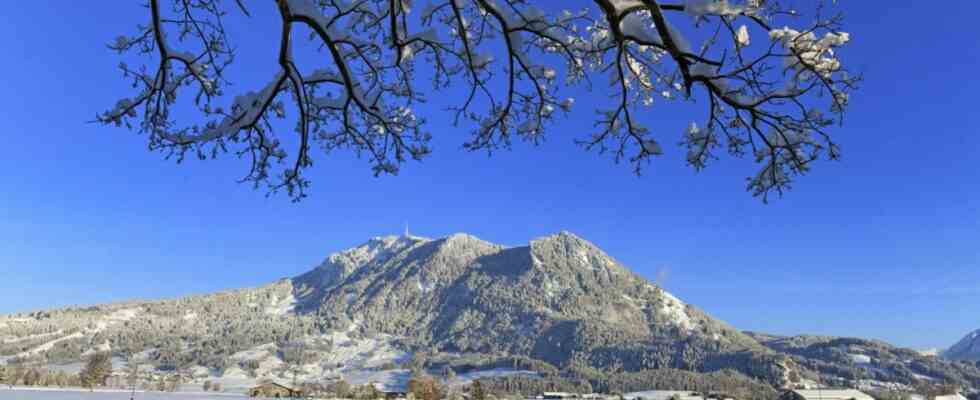Nikolaus Weißinger calls it “a shock” when he announces on Wednesday that the Grünten lifts and the associated skiing and hiking area will not be expanded and modernized as planned by the Hagenauer family of investors. “The project is dead,” says the mayor in the Rettenberg town hall. This news is obviously not good for his mood. It looks very different outside, in front of the town hall. Representatives of the Bund Naturschutz (BN) and the citizens’ initiative “Save the Greens” laugh and cheer. Thomas Frey, BN regional officer for Swabia, says: “It’s a happy day.”
For years, the project of the family of investors on Grünten has been dividing locals and foreigners. The plan has been in the media throughout Germany, emphasizes Mayor Weissinger again, to renew the dilapidated lift systems from the 1960s and to attract tourists on the mountain with new restaurants and new attractions in both winter and summer. The Grünten suddenly stood as an example for the debate as to whether the Allgäu was not now being overrun by tourists.
For the town, the failed project is now, in Weissinger’s words, “a huge investment loss”. For the nature conservationists, after the end of the ski area on the Riedberger Horn, it is further proof that “large-scale development plans in the Bavarian Alps can no longer be enforced among the population,” says BN state chairman Richard Mergner. The Bund Naturschutz is therefore demanding that Bavaria’s Economics Minister Hubert Aiwanger (FW) divert the millions for the cable car funding program, from which the Grünten project should also have benefited, into natural tourism projects. The municipality of Rettenberg now wants to develop such a concept for the Grünten.
A leisure park on the mountain, BN regional consultant Frey calls the now completed plans of the investors. A project that, from his point of view, has “lost all measure”. He once again lists what was originally planned and had also been submitted to the district office for approval up to the end: a new ten-seater gondola lift on a new route in the landscape protection area, as part of which new buildings at the valley station including a four-storey car park, the middle station and the mountain station. Three new restaurants with events and celebrations into the night, an increase in artificial snow from nine to 24 hectares, a new storage tank two football pitches in size and more than 100 new snow-making shafts for snow cannons. The critics predicted a mass rush and referred to the nearby “Alpsee Bergwelt”, where the investor family operates Germany’s longest year-round toboggan run – and where day visitors in particular cause a lot of traffic.
Years ago, more than 1,000 participants attended a demonstration at Grünten, 2,000 objections to the expansion plans were received by the district office, and 70,000 people signed a petition by the project opponents. “The stop of the plans is a credit to the social movement that has formed,” says Frey. The Bund Naturschutz and the Landesbund für Vogelschutz had repeatedly threatened to sue extensively against the implementation of the expansion plans. Rettenberg’s Mayor Weißinger has therefore considered it his task to settle the dispute from the moment he took office in 2020.
Nikolaus Weißinger, Mayor of Rettenberg, would have liked to implement the investors’ slimmed-down plans to boost tourism in the town.
(Photo: Florian Fuchs)
He emphasizes that the plans outlined by the BN in front of the town hall were no longer up for debate anyway. In fact, investors have repeatedly agreed to slim down their plans. So the decision was made early on to do without a so-called forest adventure railway, on which visitors could have slided through the forest into the valley. Weißinger wanted to downsize the project, but in the end, in consultation with the investors, the plan was to reduce lift capacity, do without the parking garage, minimize clearing, paint the snow-making pond and downsize the envisaged gastronomy. The district office organized a round table with supporters and critics, which was chaired by a mediator. And Weißinger had long talks with the more than 50 owners and the alpine cooperatives who own land on the mountain – and whose land would have had to be used or crossed for new operations.
But mistrust apparently remained high. The critics, for example, repeatedly feared that investors would use salami tactics, meaning that the slimmed-down plans would be expanded again during ongoing operations – and this would then be more difficult to prevent. “In addition, with such a compromise, more masses would still have been transported up the mountain,” complains Frey. The mayor’s efforts failed because of some of the landowners. According to Weißinger, they set conditions of use for their properties that would not have allowed the operating family to operate economically. The investors have therefore announced to him that they will drop their plans. They don’t want to express themselves. It has not yet been clarified whether the old, dilapidated lifts will be dismantled.
“We will now try to build a new, nature-friendly project together with the owners and associations,” says Mayor Weissinger. There are ideas, such as a theme trail, and in any case he wants to get a sensible visitor management system on the way. Adrian Gioja, spokesman for the citizens’ initiative “Save the Greens”, emphasizes that his fellow campaigners would like to participate in the development of a sustainable future project. And the Bund Naturschutz has also announced that it will support the municipality in establishing tourism that is independent of skiing. The Ministry of Economics is now required to provide money for visitor management “regardless of rearmament structures”, says BN regional officer Frey. Weißinger emphasizes that there was also a large injection of funds for natural offers on the Riedberger Horn when the plans for the criticized ski area were off the table. “Of course that would do us good.”

